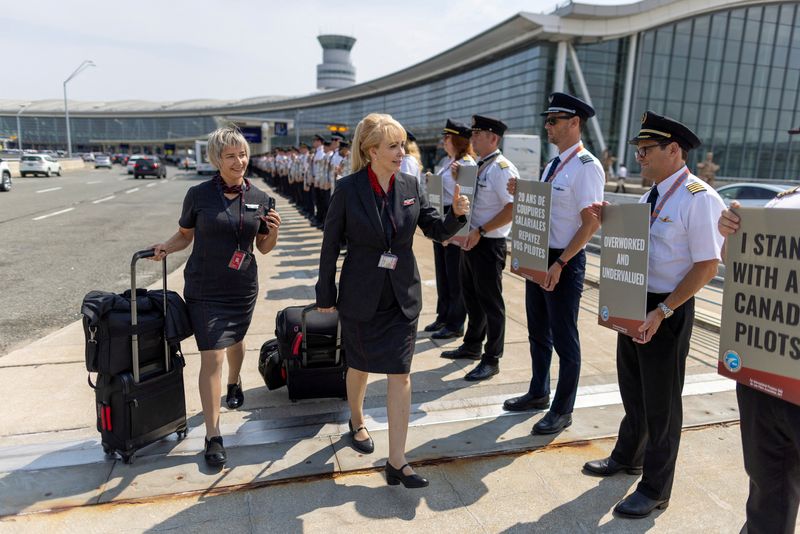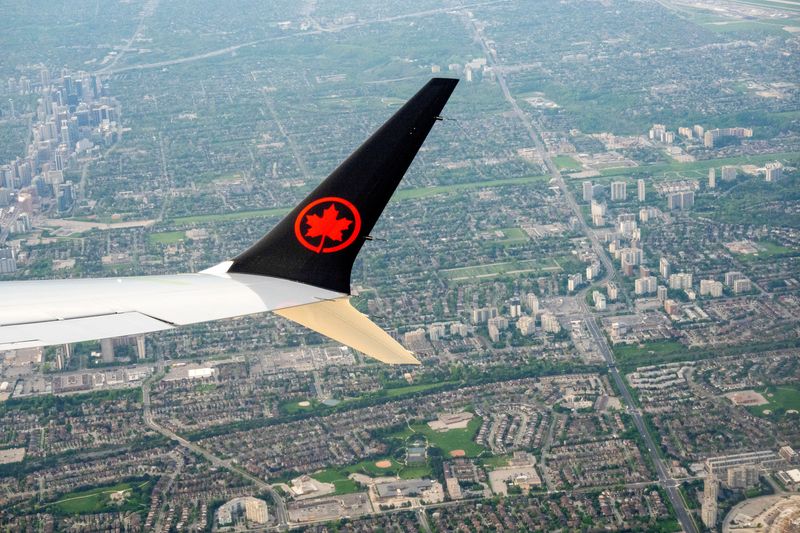By Rajesh Kumar Singh
(Reuters) -A standoff between Air Canada and its pilots over a new labor contract escalated on Thursday, as the airline took the unusual step of saying Ottawa should be ready to intervene to head off a strike.
The pilots' union warned the federal government against such a step, saying it would tip the scale in the favor of the employer and worsen labor relations.
A strike could start as soon as Sept. 18. Air Canada and its low-cost subsidiary Air Canada Rouge together operate nearly 670 flights per day, and a shutdown could affect 110,000 passengers daily as well as freight carriage.
Airline CEO Michael Rousseau said the airline was still committed to reaching a deal but accused the pilots' union of making excessive wage demands. If talks fail, a government order for binding arbitration would be needed, he said.
"The federal government should be prepared to intervene if talks fail before any travel disruption starts," he said in a statement, adding that even a short stoppage could cause prolonged disruption for customers.
While Ottawa has intervened several times in labor disputes over the last few decades, it only did so after stoppages have begun, not before.
Charlene Hudy of the Air Line Pilots Association, which represents the pilots, said she was very disappointed by Air Canada's position.
"We do not want to see any government interference in our collective bargaining ... it really has the effect of tipping the power balance in favor of the employer," she said by phone.
Federal Labour Minister Steven MacKinnon has broad powers to tackle disputes and last month intervened within 24 hours to end a stoppage at the two largest rail companies, Canadian Pacific (NYSE:CP) Kansas City and Canadian National Railway (TSX:CNR).
In its statement, Air Canada said MacKinnon's action to end the rail stoppage had set a precedent.
MacKinnon will be meeting with both sides on Thursday, said a spokesman for the minister, but gave no details.
MacKinnon has repeatedly said he wants the two sides to sort out their differences at the negotiating table.
Prime Minister Justin Trudeau told reporters in British Columbia that "the best deal happens at the bargaining table".
Around 100 business groups on Wednesday also urged MacKinnon to prevent a stoppage before it started.
Air Canada's 5,400 pilots are demanding wage rates that would narrow the pay gap with their counterparts at major U.S. carriers like United Airlines.
Pilots at U.S. airlines have negotiated hefty pay raises in new contracts in the past two years amid a travel boom and staffing shortages. United's new pilot contract, for example, included pay increases of about 42%.
As a result, some United pilots now earn 92% more than their counterparts at Air Canada, the pilots' association's data shows. In 2013, the pay gap was just 3%.
Rousseau said Air Canada had offered a wage increase of over 30%, as well as improved pension and health benefits.
The union's Hudy said a strike could be averted "if Air Canada starts to really show up" and negotiate a fair agreement.

The airline's executives had "doubled their salaries over the last decade, whereas the pilots I'm representing were being left behind in the dust," she said.
"And we can't have that gap be as large as it is right now."
